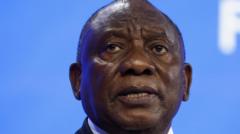Tensions between the US and South Africa escalate as Trump demands an investigation into South Africa's land reform policy, fearing it could lead to significant human rights issues.
Trump Signals Potential Funding Cuts to South Africa Over Controversial Land Reform Policy

Trump Signals Potential Funding Cuts to South Africa Over Controversial Land Reform Policy
US President Donald Trump threatens to withdraw future funding in response to South Africa's ongoing land reform debates.
In a dramatic turn of events, US President Donald Trump has announced his intentions to eliminate all forthcoming financial support to South Africa, citing serious concerns over the country’s land reform legislation signed into effect last month by President Cyril Ramaphosa. This new law permits land seizures without compensation under specific conditions and has intensified an already hotly debated issue within the nation.
The land ownership debate remains a sensitive topic in South Africa, where the legacy of apartheid continues to influence demographics of land possession. Despite most farmland still being under the control of white landowners, calls for reform have surged as the government seeks to rectify historic injustices tied to racial segregation. Thus, the recent legislative changes have drawn heavy scrutiny.
On Sunday, Trump took to the social media platform Truth Social, declaring, "I will be cutting off all future funding to South Africa until a full investigation of this situation has been completed!" In a later press briefing, he elaborated on his discontent, commenting that South Africa’s leadership is guilty of "some terrible things, horrible things," in reference to their land confiscation claims.
South Africa's International Relations Minister, Ronald Lamola, responded on X (formerly Twitter), emphasizing the need for Trump's advisors to gain a deeper understanding of South Africa’s constitutional framework during this investigative timeframe. He stressed that this would promote a more respectful approach to their democratic practices.
According to US government data, South Africa received approximately $440 million in assistance in 2023, highlighting the significance of the potential funding cuts Trump is considering. The South African government defends the new law, asserting it does not sanction arbitrary land expropriations and mandates negotiations with landowners prior to any actions taken.
Meanwhile, critics worry that the land reform measures could echo catastrophic outcomes seen in Zimbabwe, where similar policies devastated the economy and led to a significant loss of foreign investment. The unfolding situation raises critical questions about the balance of power, human rights, and historical injustices.
As the debate reverberates internationally, many will be keeping a close eye on how this contentious issue unfolds, both in the global arena and within South African society itself.
The land ownership debate remains a sensitive topic in South Africa, where the legacy of apartheid continues to influence demographics of land possession. Despite most farmland still being under the control of white landowners, calls for reform have surged as the government seeks to rectify historic injustices tied to racial segregation. Thus, the recent legislative changes have drawn heavy scrutiny.
On Sunday, Trump took to the social media platform Truth Social, declaring, "I will be cutting off all future funding to South Africa until a full investigation of this situation has been completed!" In a later press briefing, he elaborated on his discontent, commenting that South Africa’s leadership is guilty of "some terrible things, horrible things," in reference to their land confiscation claims.
South Africa's International Relations Minister, Ronald Lamola, responded on X (formerly Twitter), emphasizing the need for Trump's advisors to gain a deeper understanding of South Africa’s constitutional framework during this investigative timeframe. He stressed that this would promote a more respectful approach to their democratic practices.
According to US government data, South Africa received approximately $440 million in assistance in 2023, highlighting the significance of the potential funding cuts Trump is considering. The South African government defends the new law, asserting it does not sanction arbitrary land expropriations and mandates negotiations with landowners prior to any actions taken.
Meanwhile, critics worry that the land reform measures could echo catastrophic outcomes seen in Zimbabwe, where similar policies devastated the economy and led to a significant loss of foreign investment. The unfolding situation raises critical questions about the balance of power, human rights, and historical injustices.
As the debate reverberates internationally, many will be keeping a close eye on how this contentious issue unfolds, both in the global arena and within South African society itself.























